MSS Curbside Composting Guide
We’ve put together this composting guide to help you understand the importance of composting, what you should and shouldn’t put in your green compostables cart, and even some tips on how to make the process easy and “yuck” free.
WHAT IS COMPOSTING?
Composting is the natural process of breaking down organic materials, such as leaves, food scraps and food soiled paper, into a valuable fertilizer that can enrich soil and plants. Anything that grows decomposes eventually; composting simply speeds up the process by providing an ideal environment for bacteria, fungi, and other decomposing organisms (such as worms, sowbugs, and nematodes) to do their work. The resulting decomposed matter, which often ends up looking like fertile garden soil, is called compost. Compost is rich in nutrients and can be used for gardening, horticulture, and agriculture.
Organic matter can be processed in industrial-scale composting facilities, in smaller-scale community composting systems, in backyard composting and in anaerobic digesters, among other options. This post focuses exclusively on curbside composting, which is collected by Marin Sanitary Service at your home or business. This material is prepared for industrial-scale composting at the WM EarthCare facility in Novato to produce Marin Homegrown Compost approved for organic farming application. Together we’re closing the loop on organic waste and returning natural nutrients to local soil.
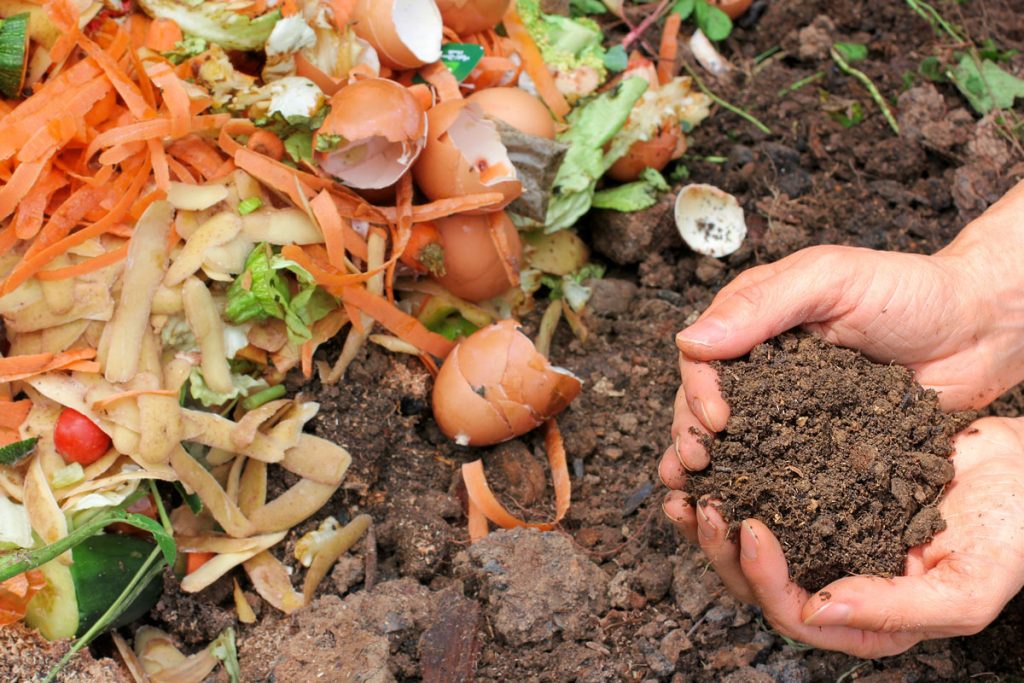
WHAT CAN GO IN YOUR GREEN CART FOR COMPOST
Marin Sanitary Service offers weekly collection of residential and commercial compostable items such as plant materials, food scraps and food-soiled paper.
We want you to compost fully but please remember to only put the following items in your green cart for compost: yard waste, food scraps and food-soiled paper.
FOOD SCRAPS
If you can eat it, it can go in the green cart!
| Meat & poultry | |||
| Dairy products | |||
| Cooking grease & oils (in small amounts mixed with dry materials) | |||
| Fats | |||
| Fruit | |||
| Vegetables | |||
| Fish & shellfish | |||
| Egg shells | |||
| Coffee grounds | |||
| Tea bags |
FOOD-SOILED PAPER
| Soiled pizza boxes (greasy) | ||
| Paper plates | ||
| Napkins & paper towels |
YARD WASTE
| Grass clippings | ||
| Leaves | ||
| Weeds | ||
| Flowers | ||
| Straw | ||
| Shrub & tree clippings | ||
| Branches under 4 feet long & 3 inches in diameter |
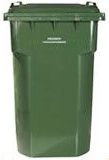
WHAT CANNOT GO IN YOUR COMPOSTABLES CART
We CANNOT accept any plastics labeled as compostable or bio-degradable because they take twice as long to breakdown as the natural compostable material (yard waste, food scraps and food-soiled paper) we collect and send to the WM EarthCare composting facility. Moreover, the high-quality compost that WM EarthCare produces would lose its organic farming certification if compostable or bio-degradable plastics were mixed in with the yard waste, food scraps and food-soiled paper we collect. Please DO NOT put any of the following items in your green cart for compost:
| – | NO Compostable or Bio-degradable plastics of any kind | |
| – | NO Compostable or Bio-degradable bags |
| – | NO Compostable or Bio-degradable cups or containers | |
| – | NO Compostable or Bio-degradable utensils |
| NO Plastic bags | ||
| NO Coffee cups | ||
| NO Paper soft drink cups or paper soup cups | ||
| NO Cartons | |
| NO Waxed cardboard | |
| NO Waxed paper | |
| NO Palm fronds | |
| NO Yucca | |
| NO Poison Oak | |
| NO Bamboo | |
| NO Pet or human waste |

WHERE DOES IT GO, JOE?
If you aren’t sure about whether a material belongs in your compostables cart, use our handy “Where Does It Go, Joe?” online tool to find out.
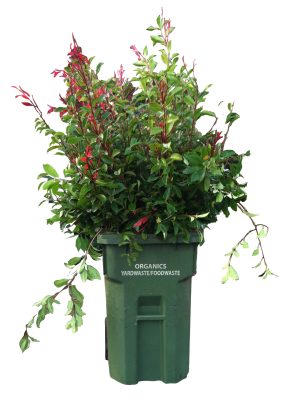
DON’T TURN YOUR CART INTO A VASE
Please don’t overfill your compostables cart, it’s unsafe for our drivers.
Contact our customer relations team at (415) 456-2601 prior to your service day if you find that your total amount of compostable waste (yard waste, food waste & food-soiled paper) exceeds the capacity of your container.
Do not turn your compostables cart into a vase, please! Call us in advance for assistance if the lid won’t close.
HELPFUL TIPS TO MAKE CURBSIDE COMPOSTING EASY
- Compost kitchen pails will stay cleaner if you line them with paper!
- You can put your compostable items in a paper bag, which can go right into the green Compostables Recycling cart!
- Hate the smell of rotting food in your home? Place the compostable items in the fridge or freezer to prevent food from rotting as quickly. Make sure to empty your compost pail regularly and clean it after emptying it!
- Adding layers of yard waste and/or newspaper in your compost cart can help reduce the smell and rotting of food waste in the Compostables Recycling cart.
- Is your compost cart starting to smell? Feel free to give us a call and order a “steam clean” of your green cart for just $15.
- Dirt/soil and other non-organic waste including bio-plastics are not allowed in the Compostables cart.
- The dark green carts you see around Marin are NOT compost carts. These are used exclusively for food waste disposal by restaurants, grocery stores and other large food waste generators to create renewable energy through our Food to Energy (F2E) program. Please DO NOT contaminate our F2E carts with any yard waste, food-soiled paper or bio-plastics.
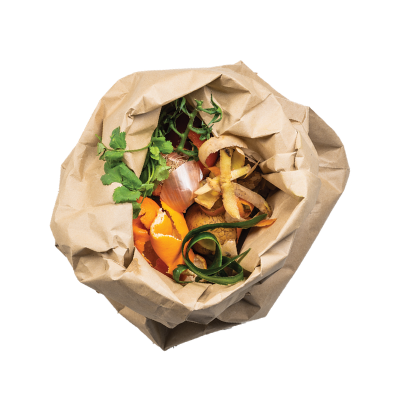
COLLECTING KITCHEN SCRAPS
Using a brown paper bag to line your kitchen compost pail helps keep the pail clean and makes transferring food scraps to your green Compostables Recycling cart easy.
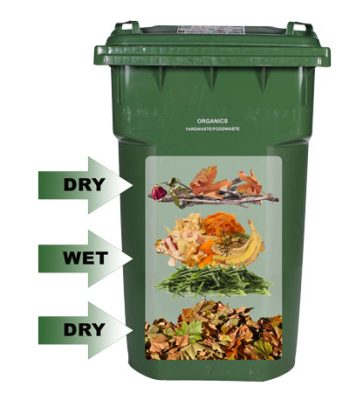
KEEP YOUR COMPOSTABLES CART CLEAN
Layering wet and dry organics will help absorb some of the odor and “yuck” from your Compostables cart. You can also layer in newspaper. It really helps!
Benefits of Composting
Cuts Methane Emissions From Landfill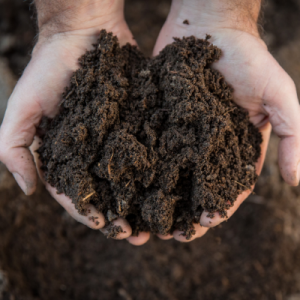
Removing organic material from the landfill is a top priority for us. Not only does proper disposal of organic materials produce a soil amendment for California farmers, the removal also has an impact on reducing greenhouse gases. When organic material like food waste is landfilled, it breaks down anaerobically (without oxygen), creating methane and other greenhouse gases that leak from landfills and contribute to climate change. Landfills are the third-largest source of human-generated methane emissions in the United States.
Improves Soil Health and Decreases Erosion
Compost is an essential tool for improving small and large-scale agricultural systems. Compost contains three primary nutrients needed by garden crops: nitrogen, phosphorus, and potassium. It also includes traces of other essential elements like calcium, magnesium, iron, and zinc. Instead of relying on synthetic fertilizers that contain harmful chemicals, composting offers an organic alternative. Research has shown the capability of compost to increase soil’s water retention capacity, productivity, and resiliency.Conserves Water
Agriculture is a major consumer of water in the United States, accounting for approximately 80 percent of the nation’s water use. How can compost help? Research has shown the water-retaining capacities of soil increase with the addition of organic matter. By using compost to foster healthy soil, farmers do not have to use as much water and can still have higher yields compared with farming with degraded soil.Reduces the Waste Stream
Composting is a great way to recycle the organic waste we generate at home. Food scraps, garden waste and compostable paper combined make up more than 38 percent of what we send to the landfill in Marin County and 34 percent in California overall. Not only is food waste a significant burden on the environment, but processing it is costly. The average cost to landfill municipal solid waste in the United States was around $55 per ton in 2019. With the United States generating more than 267 million tons of municipal waste in 2017 and California disposing approximately 30 million tons of waste in landfills each year, of which more than 30 percent could be used for compost or mulch, we could save billions of dollars diverting the organic material from the landfill. In California alone, we send 11 billion pounds of food waste to landfills each year. The best way to reduce impacts from food waste is to prevent waste from occurring in the first place. However, even if we do everything possible to decrease food waste, there will still be food scraps that cannot be consumed (for example, a banana peel). Composting is a great way to divert those food scraps from the landfill.
Let’s Compost, it’s the Law
In September 2016, Governor Brown signed into law SB 1383 establishing methane emissions reduction targets in a statewide effort to reduce emissions of short-lived climate pollutants (SLCP). SB 1383 requires the state to reduce organic waste [food waste, green waste, paper products, etc.] disposal by 75% by 2025 and the law also requires the state to increase edible food recovery by 20 percent by 2025. In order to get to those disposal goals, the law requires all residents and businesses in the State to have organic waste collection service and it also requires local jurisdictions to establish edible food recovery programs that recover edible food from the waste stream. Diverting your organic material (yard waste, food scraps and food-soiled paper) from the landfill will help reduce emissions of harmful greenhouse gases like methane gas, and will reduce the impacts of climate change in our life time.
Learn more about the California recycling laws that may impact you.



